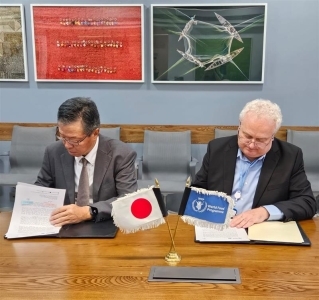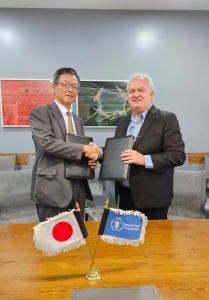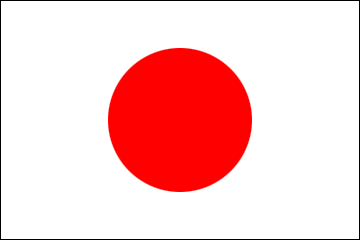What's New
2025/9/29
JAPAN PROVIDES US$3.4 MILLION NEW FUNDING FOR WFP’S LIFESAVING ASSISTANCE TO ROHINGYA REFUGEES AND HOST COMMUNITIES


DHAKA, 29 September – The United Nations World Food Programme (WFP) welcomes a timely contribution of Japanese Yen 500 million (approx. US$3.4 million) from the Government of Japan towards its lifesaving support to both Rohingya and host communities.
“Japan stands firmly with Bangladesh and the international community in ensuring the basic needs of the Rohingya population are met, and that the most vulnerable members of the host communities, particularly women and children, are also supported,” said Ambassador SAIDA. “We are deeply concerned about the growing needs in the camps and the sharp decline in humanitarian funding. Japan remains committed to working with WFP and all partners to prevent a worsening humanitarian crisis and contribute to a long-term solution where the Rohingya can return to Myanmar safely and with dignity.”
With the latest contribution from Japan, WFP will provide monthly food assistance and nutrition support to more than 100,000 Rohingya refugees and 2,000 vulnerable Bangladeshis. Families will receive e-vouchers to buy a variety of foods at camp stores, including rice, lentils, and fresh vegetables. Special nutrition support will reach young children and pregnant or breastfeeding women, both inside and outside the camps, to prevent and treat malnutrition.
Since early 2024, nearly 150,000 more Rohingya have arrived in the camps due to intense fighting in Rakhine State, Myanmar. The total population has exceeded 1.1 million people. Despite the rising needs, a sharp decline in international funding has put the entire humanitarian response at risk, threatening critical services such as food, cooking gas, nutrition, healthcare, education, and protection.
Unless new funding is secured – at least US$60 million over the next six months, and
US$167 million over the next 12 months – WFP faces the risk of a major disruption to its food assistance starting in December 2025.
“We are deeply grateful for Japan’s steadfast partnership and the generosity of the people of Japan,” said Dom Scalpelli, WFP Country Director in Bangladesh. “The crisis is at a crossroads. We call on all partners to help prevent a further deterioration of the humanitarian situation in the camps. At WFP, we will continue to do our part – to stretch every dollar and ensure efficiency, transparency, and value for money.”
To date, WFP has already generated measurable savings – US$19 million is expected across the current and upcoming implementation periods – through programme optimization, financial and logistical streamlining, interagency cost-sharing, and other efficiency measures. Already, 82 cents of every dollar now goes directly to supporting the Rohingya – up from 71 cents in mid-2023.
Since the beginning of the emergency in August 2017, Japan has supported the Rohingya refugee response in Bangladesh, contributing over US$240 million to WFP and other UN agencies as well as NGOs in Bangladesh, including through this new funding.
About WFP:
The United Nations World Food Programme is the world’s largest humanitarian organization saving lives in emergencies and using food assistance to build a pathway to peace, stability and prosperity for people recovering from conflict, disasters and the impact of climate change.
Follow us on X @wfp_bangladesh, Facebook @WFPinBangladesh, Instagram @wfp_bangladesh
“Japan stands firmly with Bangladesh and the international community in ensuring the basic needs of the Rohingya population are met, and that the most vulnerable members of the host communities, particularly women and children, are also supported,” said Ambassador SAIDA. “We are deeply concerned about the growing needs in the camps and the sharp decline in humanitarian funding. Japan remains committed to working with WFP and all partners to prevent a worsening humanitarian crisis and contribute to a long-term solution where the Rohingya can return to Myanmar safely and with dignity.”
With the latest contribution from Japan, WFP will provide monthly food assistance and nutrition support to more than 100,000 Rohingya refugees and 2,000 vulnerable Bangladeshis. Families will receive e-vouchers to buy a variety of foods at camp stores, including rice, lentils, and fresh vegetables. Special nutrition support will reach young children and pregnant or breastfeeding women, both inside and outside the camps, to prevent and treat malnutrition.
Since early 2024, nearly 150,000 more Rohingya have arrived in the camps due to intense fighting in Rakhine State, Myanmar. The total population has exceeded 1.1 million people. Despite the rising needs, a sharp decline in international funding has put the entire humanitarian response at risk, threatening critical services such as food, cooking gas, nutrition, healthcare, education, and protection.
Unless new funding is secured – at least US$60 million over the next six months, and
US$167 million over the next 12 months – WFP faces the risk of a major disruption to its food assistance starting in December 2025.
“We are deeply grateful for Japan’s steadfast partnership and the generosity of the people of Japan,” said Dom Scalpelli, WFP Country Director in Bangladesh. “The crisis is at a crossroads. We call on all partners to help prevent a further deterioration of the humanitarian situation in the camps. At WFP, we will continue to do our part – to stretch every dollar and ensure efficiency, transparency, and value for money.”
To date, WFP has already generated measurable savings – US$19 million is expected across the current and upcoming implementation periods – through programme optimization, financial and logistical streamlining, interagency cost-sharing, and other efficiency measures. Already, 82 cents of every dollar now goes directly to supporting the Rohingya – up from 71 cents in mid-2023.
Since the beginning of the emergency in August 2017, Japan has supported the Rohingya refugee response in Bangladesh, contributing over US$240 million to WFP and other UN agencies as well as NGOs in Bangladesh, including through this new funding.
About WFP:
The United Nations World Food Programme is the world’s largest humanitarian organization saving lives in emergencies and using food assistance to build a pathway to peace, stability and prosperity for people recovering from conflict, disasters and the impact of climate change.
Follow us on X @wfp_bangladesh, Facebook @WFPinBangladesh, Instagram @wfp_bangladesh
